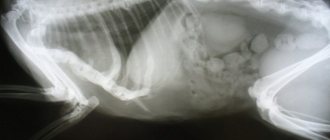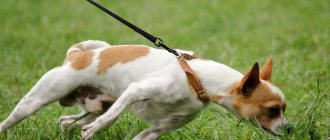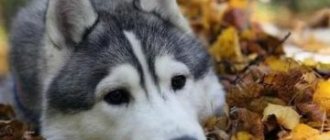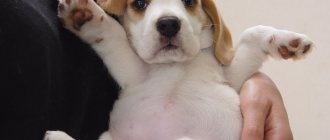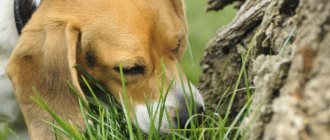Young dogs are the most inquisitive pets. If it is enough for kittens to simply smell an unfamiliar object, then puppies must definitely taste it. But sometimes curiosity persists until a very advanced age.
In such cases, the owner is perplexed for a long time why the dog eats soil on the street or from a flower pot, and sometimes tries to swallow completely inedible-looking stones. There are several explanations for this behavior, and some of them are quite dangerous.
Why does a dog eat stones, sand and dirt?
Before consulting a doctor, analyze the possible causes yourself. If they are not associated with mental disorders and other diseases that require mandatory drug treatment, you can easily cope with the problem on your own.
Diseases that cause perverted appetite
One of the pathological reasons why a dog eats soil is pica, or perverted appetite. This disorder is expressed in an irresistible desire to try any unusual and inedible objects. Pica is not an independent disease, but a rather alarming symptom that accompanies the following pathologies:
- Helminthiasis
. Infection with helminths is a serious blow to the body. These parasites not only take away some of the vital elements, but also poison the patient with the products of their vital activity. The animal suffers from constant itching and loses a lot of weight, despite a fairly good appetite.
- Immunodeficiency
. This dangerous infection causes a serious blow to the immune system, increasing vulnerability to other diseases.
- Hypothyroidism
. This disease of the endocrine system, which occurs when there is insufficient amount of thyroid hormones, is accompanied by alopecia (baldness), hyperpigmentation and cold skin.
- Intestinal dysbiosis
. It interferes with the absorption of B vitamins, causing the development of anemia. You can suspect something is wrong by bloating and flatulence.
Substances contained in the soil stimulate the functioning of the gastrointestinal tract, so animals eat them intuitively - at the level of instincts. Thanks to improved peristalsis, some toxins leave the body naturally.
Despite this feature, you should not ignore the problem that has arisen. Regular and prolonged consumption of such “food” can lead to more severe complications than the existing disease.
Lack of vitamins and poor nutrition
A dog can eat dirt when it lacks something. This behavior is typical for animals with vitamin deficiency and deprived of adequate nutrition. Not getting enough elements from food, they try to fill the mineral deficiency with the help of fertilizers.
A prolonged lack of vitamins and minerals is fraught with the development of anemia and immunodeficiency. Both of these diseases are destructive to the body and often provoke the development of secondary pathologies.
The described problem often occurs in four-legged pets that receive insufficient amounts of meat and bones. Excessive heat treatment also plays a significant role, destroying not only parasites, but also most beneficial microelements.
Mental disorders
If your dog chews on stones, you should check his mental health. Animals taken from the street often suffer from such violations. Living for a long time in difficult conditions contributes to the development of some behavioral problems: fear of strangers and loud noises, as well as involuntary urination from joy, even in adulthood.
Those who have lived in an environment of love and care since childhood can also suffer from behavioral disorders. Such pets often experience depression due to the loss of one of their owners or other pets, as well as lack of attention and physical activity. Because of this, they behave very depressed or, conversely, hyperactive.
A negative reaction to a perverted appetite will only increase their confidence in the correctness of their actions, so it should be avoided.
Non-dangerous causes found in puppies
Maximum curiosity is characteristic of children. If a puppy eats earth and stones, then in this way he simply learns about the world around him with the help of his senses. A completely unsightly-looking stone may contain traces of ice cream that accidentally fell from a cone. You won't realize it, but a dog's nose can smell a tasty treat a mile away.
Another possible reason is the change of baby teeth, accompanied by maddening itching. By chewing sticks and small pebbles, your pet soothes its aching gums.
As an alternative, offer him a chew toy from the pet store. With its help, you can not only relieve unpleasant feelings, but also avoid the appearance of caries.
What should an owner do if a dog eats stones?
First of all, it is advisable to take your pet to the veterinarian. After a diagnostic examination, he will either confirm or rule out the presence of diseases. Even if vitamin deficiency is detected, the trip will be useful - the doctor will prescribe the appropriate vitamins for the dog.
If the pet is absolutely healthy, then behavioral disorders will have to be eradicated. First of all, you should think about whether your four-legged friend gets enough attention and exercise? Perhaps he will forget about his bad habit if he walks longer with his owner, visits training grounds more often and receives more affection from him.
In addition, the dog should be trained - a well-mannered pet who has mastered prohibitory commands well will not engage in “stupid things” for no reason, for example, picking up trash on the street.
It is worth noting that among o-poodles, Labradors, huskies, spaniels, as well as homeless “wanderers,” there are often individuals with a perverted appetite. Even if you catch a pet doing something “indecent”, you cannot use physical punishment; it is enough to say “no” or “ugh”.
Dogs are man's best friends, living side by side with him for many millennia. They are able to adapt to the owner, his habits, daily routine and even behavior. Likewise, the owner should be more tolerant and forgive some of the oddities of his four-legged comrade. But it is worth knowing which habits do not deserve attention, and which ones harm, first of all, the pet itself.
Very often, inexperienced owners encounter strange behavior in their pets. For example, some puppies begin to empty the contents of flower pots or chew soil from a neighbor's flowerbed. After reading today's article, you will understand why dogs eat soil and whether they need to be weaned from this habit.
The dangers of eating soil
If your four-legged pet is partial to soil and dirt, it is necessary to wean him off this dangerous habit as soon as possible. Otherwise, the following complications may occur:
- Gastrointestinal disorder
. Poisons and toxins settling in urban soil can cause acute vomiting, diarrhea or constipation.
- Dental trauma
. Unlike guinea pigs, dog teeth do not need to be ground down. They change only once in a lifetime and do not grow back. Food that is too hard damages the enamel and creates cracks that can lead to the development of caries.
- Damage to mucous membranes and internal organs
. Sharp stones pose a serious danger to soft tissues and can cause numerous internal bleedings.
- Parasite infestation
. Street dirt not only contains dangerous chemicals and particulates, but also worms.
- Intestinal obstruction
. A small pebble swallowed by a curious puppy will likely come out naturally. You should be concerned when swallowing objects that are too large or several at the same time. In this case, they can block the exit from the intestines, causing toxin poisoning.
- Suffocation
. An object that is too large is dangerous not only by blocking the digestive tract, but also by cutting off oxygen. A choking pet may suffocate.
Stagnation of feces, characteristic of intestinal obstruction, can result in rupture of an overloaded organ. The only way to save an animal is through surgery, so be sure to show it to the doctor at the first sign of discomfort.
What to do if your dog eats soil
The first thing to remember is that physical punishment and yelling are useless and dangerous. If the pet is not familiar with the prohibition commands, then the words “fu” and “no” will be an empty phrase for him.
If the reason for the strange behavior is a lack of attention, then even a rude attitude on the part of the owner will be considered as approval of the committed act.
Depending on the cause of perverted appetite, the problem that has arisen can be solved in three ways: education, treatment, or dietary revision.
Behavior correction and training
The method of distraction and training in prohibition commands will help correct unwanted behavior. The easiest way is to contact a dog trainer, but it is much more effective to achieve the desired result yourself. To do this, follow these recommendations:
- Use sound stimuli. When you notice eating dangerous objects, whistle or clap your hands. Try to remain unnoticed to avoid redirected aggression.
- Buy several chew toys and carry them with you at all times. Try exchanging a pebble you like for a squeaking chicken and be sure to praise your pet if successful. Try to use different toys so as not to lose reciprocal interest on the part of the dog.
- Change walking routes and offer joint games. New activities, playing with a frisbee or jogging together will distract you from extraneous stimuli and strengthen your bond with your pet.
- Learn the "fu" and "don't" commands. It is easiest to train puppies, but with proper persistence, even adult animals can remember the prohibition commands. If your pet spits out or ignores a dangerous object, praise it and give it a treat.
Be sure to keep your dog on a leash while walking. With the help of ammunition it is much easier to stop another attempt to eat something dubious. Remember that an animal can and should be scolded, but only with the help of intonation and only before it approaches you.
An accusing tone during an unwanted behavior and a mandatory reward for stopping the unwanted action will have a much greater effect than senseless screams and frightening hand waving for the dog.
Treatment of psychological or physiological abnormalities
If your puppy constantly eats dirt and stones, ask your veterinarian what to do. Such systematicity is not characteristic of ordinary curiosity, so his behavior is most likely explained by illness or lack of attention. Drug treatment may include the following medications:
- anthelmintics that destroy internal parasites;
- antiviral and immunomodulators necessary to contain the immunodeficiency virus;
- hormonal agents that normalize hormone levels in hypothyroidism;
- antibiotics that fight the causative agent of dysbiosis, and probiotics that restore intestinal microflora.
For psychological problems caused by stress, it is recommended to get rid of the source of anxiety and take sedatives. Try to spend more time with your pet, keeping him active. Agility, a sports discipline based on teamwork between the owner and the pet, gives good results.
Causes of perverted appetite in dogs
- A puppy can taste everything (including soil) simply out of exploratory curiosity. It can be satisfied quite quickly without any consequences.
- Moreover, in this way a puppy or young dog can attract the attention of the owner.
- However, eating soil can also indicate the animal’s psychological discomfort.
- Another group of reasons are physiological factors. For example, a lack of important microelements in the dog’s body, such as carbon or calcium.
Most often this applies to adult dogs that are trained not to eat anything on the ground. Therefore, such behavior that appears suddenly should lead to certain thoughts.
What to do?
- If a small puppy eats dirt, then this becomes a reason to start teaching him a very important command: “Fu.”
- As soon as you see that the baby is showing interest in the soil, you need to sharply, but not forcefully, pull the leash and say threateningly: “Ugh” or “You can’t.”
- At the same time, you need to have some goodies with you to reward your baby for correct behavior.
- Every time as soon as the dog obeys the command and stops being interested in the ground, it needs to be rewarded with a treat.
- Then she will learn that everything tasty is either in the owner’s hand or in her home bowl, and nowhere else. If there is a suspicion that a dog's eating soil is associated with depression, it is necessary to carefully study the animal's living conditions: whether any stress factors have recently appeared.
For example, this may be due to the arrival of a new tenant in the house, including a child, a change in the dog’s usual position, etc. If an adult dog suddenly starts eating soil, you also need to carefully study the animal’s diet.
If it eats natural food, then you should think about supplementing with microelements or introducing beef tripe into the diet. You can also do it the old fashioned way: place a piece of charcoal and chalk near the dog’s bowl.

